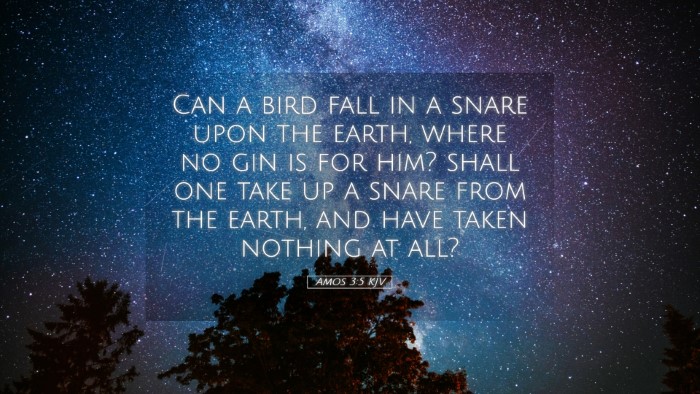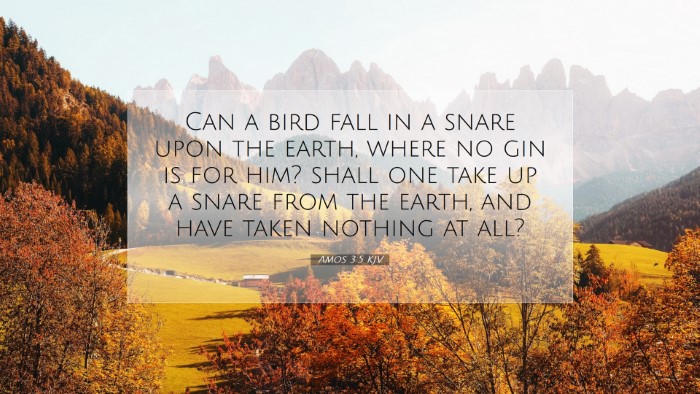Old Testament
Genesis Exodus Leviticus Numbers Deuteronomy Joshua Judges Ruth 1 Samuel 2 Samuel 1 Kings 2 Kings 1 Chronicles 2 Chronicles Ezra Nehemiah Esther Job Psalms Proverbs Ecclesiastes Song of Solomon Isaiah Jeremiah Lamentations Ezekiel Daniel Hosea Joel Amos Obadiah Jonah Micah Nahum Habakkuk Zephaniah Haggai Zechariah MalachiAmos 3:5
Amos 3:5 KJV
Can a bird fall in a snare upon the earth, where no gin is for him? shall one take up a snare from the earth, and have taken nothing at all?
Amos 3:5 Bible Commentary
Amos 3:5 - Biblical Commentary
Verse: "Will a lion roar in the forest, when he hath no prey? will a young lion cry out of his den, if he have taken nothing?" (Amos 3:5)
Introduction
The book of Amos is part of the Minor Prophets in the Old Testament, and it is a profound witness to God's justice and the call for repentance. In Amos 3:5, the prophet provides a vivid imagery that serves as a rhetorical question, emphasizing the principle of cause and effect. This verse speaks to the inevitability of consequences following actions, particularly in relation to God's dealings with Israel.
Contextual Overview
Amos, a shepherd from Tekoa, prophesied during a period of relative prosperity in Israel, marked by social injustice and spiritual complacency. His message transcends his time, addressing the breach between covenant privilege and moral responsibility. In the verses surrounding Amos 3:5, we find a series of questions designed to awaken the consciousness of the people of Israel to their moral and spiritual failures.
Exegesis of the Verse
The imagery of a lion is significant. The lion symbolizes strength and the apex of the food chain, representing both power and predation. According to Matthew Henry, the lion's roar is a clear indication of its success in hunting. The questioning implies that just as a lion does not roar without having caught its prey, so too, God’s judgments and proclamations are not made without just cause.
Literal Truth and Spiritual Insight
Albert Barnes reflects on the literal truth in these metaphors. He notes that the lion does not express its dominion and power unless it has secured its prey. This aligns with the overarching theme in Amos that God's judgments would not come to pass without a legitimate reason tied to the sins of the people.
Implication of Judgment
The implications of this verse extend beyond the immediate context of prophetic warning to a broader theological understanding. Adam Clarke emphasizes that just as certain outcomes follow specific actions in nature, so the actions of Israel—particularly their injustices and idolatries—would inevitably lead to divine judgement. God's voice, like the roar of a lion, signals the presence of something significant—His displeasure with the state of His people.
Theological Themes
- Covenant Accountability: There is a strong emphasis on the idea that Israel is in a covenant relationship with God, which brings with it responsibilities and accountabilities. Henry highlights that God does not act arbitrarily; His actions are rooted in His covenantal relationship with Israel.
- Divine Sovereignty: The majesty of God as the sovereign judge is underlined. God’s decrees come forth not as whims but as just responses to human behavior. This sovereignty, akin to the lion's roar, is both powerful and authoritative, calling Israel to account.
- The Reality of Divine Judgment: The passage underscores the principle that God will not judge without just cause. Clarke reiterates that the knowledge of God's judgments should lead to repentance, expressing the love of God in calling His people back to righteousness.
Applications for Today
For modern pastors, theologians, and students, Amos 3:5 serves as a reminder of the seriousness of sin and the resulting judgment it incurs. The vivid imagery captivates the audience's attention, challenging them to consider their own lives in the light of divine justice.
- Self-Examination: Just as Amos called Israel to self-examination, so too must believers today reflect on their lives. Are there areas where they have strayed from God’s commandments?
- Understanding God's Nature: The verse invites believers to understand the nature of God—a God who roars like a lion when declaring judgment but who also seeks reconciliation and repentance.
- Encouragement for the Faithful: For those who uphold justice and righteousness, Amos 3:5 can be a source of encouragement. Just as a lion's roar signifies strength, so too, the proclamation of God's truth fortifies believers in their witness amid a culture that often departs from biblical principles.
Conclusion
Amos 3:5 reflects profound truths regarding the nature of God, the seriousness of sin, and the inevitable nature of judgment. The insights drawn from the commentaries by Matthew Henry, Albert Barnes, and Adam Clarke provide a rich tapestry of understanding that is applicable across generations. To respond to such a verse is to embrace a deeper relationship with God, to seek genuine repentance, and to recognize the gravity of our covenant responsibilities as God's people.


